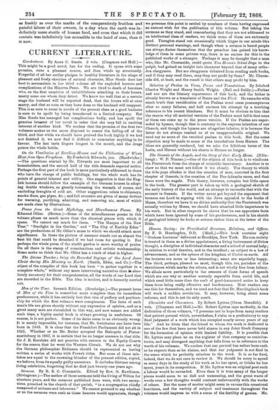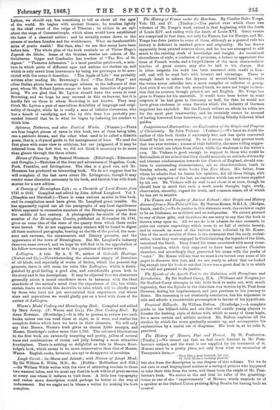Chronicles and Characters. By Robert Lytton (Owen Meredith). 2 vols.
(Chapman and Hall.)—Mr. Robert Lytton says modestly, in the dedication of these volumes, "I presume not to hope from many readers that patient perusal which, nevertheless, I claim as a preliminary to any final judgment of a work which has occupied nearly seven years of my life." And he hints that the friend to whom the work is dedicated is one of the few that have never held shares in any Joint Stock Company for the formation of opinion with limited liability. It is possible that Mr. Lytton may place us on the register of that company as contribu- tories, and may disregard anything that falls from us in reference to the worth of his volumes. We confess that our perusal has rather been such as he expects than as he claims, and that our judgment is not final in the sense which he probably attaches to the word. It is so far final, indeed, that we do not care to review it. We should be sorry to spend as many days in the study of his work as he has spent, or thinks he has spent, years in its composition. If Mr. Lytton was an original poet such a labour would be rewarded. Even then it is true many of the longer pieces would seem to us dull and unmeaning, and the great waste of words over a few thoughts would contrast unfavourably with the works of others. But the mass of matter might seem to excuse this occasional heaviness, and the variety of subject and treatment throughout the volumes would impress us with a sense of the fertility of genius. Mr. Lytton, we should say, has something to tell us about all the ages of the world. He begins with ancient Greece ; he touches lightly on the chief event of the reign of Tiberius ; he niches in an epic about the siege of Constantinople, which alone would have established the fame of a classical author ; and he actually comes down to the streets of modern London and the workhouses. What an inexhaustible mine of poetic wealth! But then, alas ! we see that many have been before him. The whole plan of the book reminds us of Victor Hugo's Legends des Sides. Some of the Grecian stories are echoes of Mr. Swinburne. Gyges and Candaules has touches of " The Eve of St. Agnes." "Thanatos Athanaton" is a most peculiar patchwork, a mix- tare in which poets of different ages and nations are shaken up, and which is only saved from irreverence by being too grotesque to be asso- ciated with the scene it describes. "The Apple of Life" was probably written after reading Mr. Browning's Saul. "The Dead Pope " and other Italian pieces bear even stronger witness to the influence of that poet, whom Mr. Robert Lytton seems to have an intention of popular- izing. We are glad that Mr. Lytton should have the sense to read Browning, and we hope he may succeed in this endeavour, but it is hardly fair on those to whom Browning is not known. They may think Mr. Lytton a poet of marvellous flexibility of language and origi- nality of thought, while he is really a man of infinite cleverness, who has a knack of versifying, and who by this time has probably per- suaded himself that he is what ho began by inducing his readers to think him.



































 Previous page
Previous page